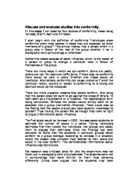Odesanya Atilola
Name: Odesanya Atilola
Class: AS Psychology group1
Key Skills Assignment Topic: Describe and Evaluate Studies on Conformity. (Key study Solomon Asch)
Lecturer: Kim Weeks
Conformity is defined as a change in a person’s opinion or behaviour as a result of real or imagined pressure from a group of people. This pressure to act like other people sometimes, despite our true feelings and desires, is common in our everyday lives. This is due to implied and spoken rules of the situation.
People conform due to two different reasons. People conform either by informational influence or normative influence. Deutsch and Gerard (1955) gave a definition on informational and normative social influence:
Informational social influence is a situation whereby the individual has a desire to be right in the knowledge and judgement of others, shown in Sherif’s study. People change their opinion because of a number of different reasons including status and roles and familiarity. Informational influence leads usually to internalisation, where what a person believes actually changes. While
Normative social influence is basically a situation whereby an individual has the urge or the want to be liked and accepted by others, as shown by Asch’s experiment. Normative does not change private opinion; it affects public opinion because of compliance, where people, even though they don’t believe in it, comply for the above reason of wanting to be accepted.

This is a preview of the whole essay
Peer Reviews
Here's what a star student thought of this essay
Quality of writing
The Quality of Written Communication is very good. From both a Psychology perspective and an English perspective the candidate uses language confidently and fluidly. There is no cause for concern with regards to abiding by the rules of Standard English as the candidate's grammar, spelling and punctuation are all accurate, and the use of complex psychological terminology applied appropriately indicates a candidate who writes with flair and knowledge about the language of Psychology.
Level of analysis
The Level of Analysis is typically prescriptive of a Psychology answer, but this candidate does offer a very good analysis of studies into conformity, primarily citing Asch with a good level of detail. The candidate provides an array of strengths and weaknesses pertaining to he study and links them back to how valid it makes the results about conformity. The extra marks that so many candidates miss is in that last point - linking the strength/weakness back to the focus of the question. There is usually a mark for identifying an evaluation point; saying why it is a strength/weakness to the study in question; and then linking back to how this affects the validity of the behaviour being questioned.
Response to question
This is a very good essay that goes to explicit depth when talking about conformity, it's presence in social situations, and how it affects our behaviour. They also take the time to differentiate between informative social influence and normative social influence. Here though, the informative social influence definition is a little ambiguous and could confuse non-psychology students, so I'd recommend taking a look at that and ensuring that you make it clear that the conformity is a result of information given to you by others. Elsewhere, I like the use of studies as a way of validating the evaluation, and also the clear instructions as to how Asch conducted his study (the candidate could be even clearer about the actual procedure though, and what was shown on the cards e.g. Line A, B, C and X). There is a good discussion about the strengths and weaknesses of Asch's study, creating a balanced analysis to aid the candidate to answering the question.








